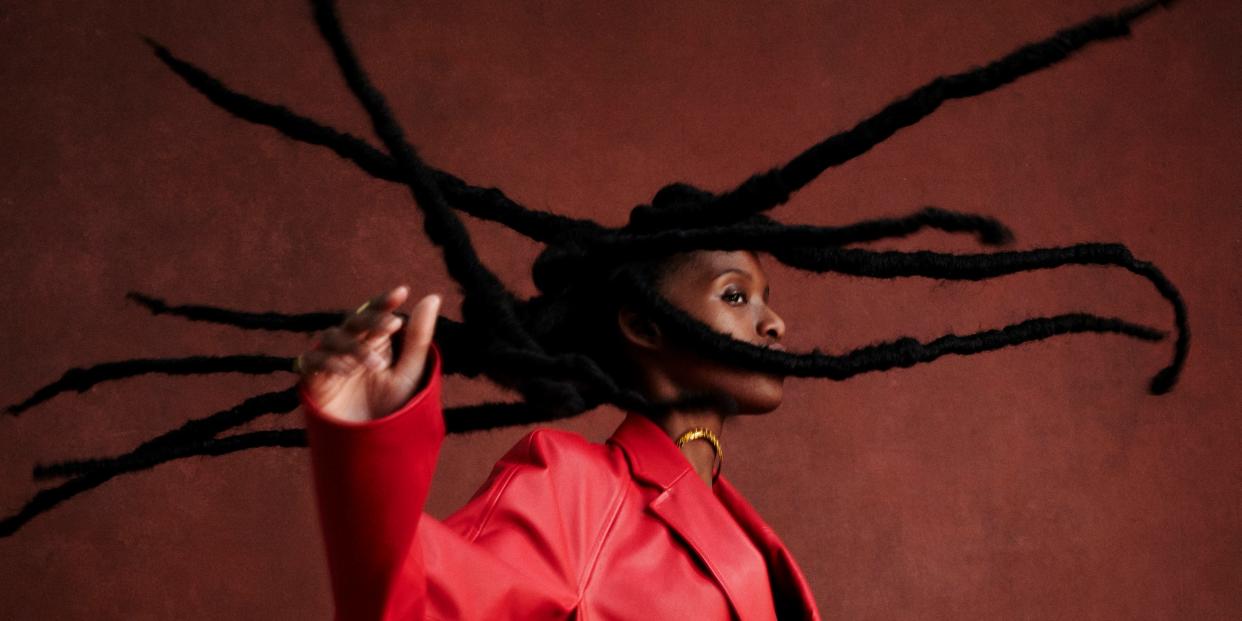How Black-Owned Hair Salons Turned Beauty Spaces Into A Thriving Community

In a bright, palm-tree filled hair salon on the corner of Portobello Road in London, there is a calm amid the chaos of an endless stream of clients arriving through the doors – literary stars, thought leaders, A-list actors – all coming in for a hair refresh.
Beyond the new braids and trimmed fringes, they’re congregating at Charlotte Mensah’s Hair Lounge to catch up with Mensah herself and her team, to make new connections and gossip, to learn to care for their daughter’s curls and, of course, to eat some of the owner’s famous homemade cake, spiced with nutmeg sourced from a client who flies it in from Grenada.
FIND OUT MORE ON ELLE COLLECTIVE
‘Living with my grandmother in Ghana, that’s just what she did. Everybody who came to our house was welcomed with food. It just makes them feel more relaxed,’ Mensah tells me. Raised on a compound farm in Ghana, where community is integral to daily life, Mensah sought to recreate the same feeling of family and togetherness in her salon. The serene space has been a pillar of the neighbourhood for the past 24 years. Favours are exchanged with the coffee shop next-door and curl workshops are held.
Mensah often finds herself collaborating with writers and artists- turned-clients through shopping events and poetry readings. From Zadie Smith to Erykah Badu, the Hair Lounge is filled with trailblazers. ‘It’s a beautiful sanctuary, an elevated salon experience. A slice of her cake alone is worth the trip,’ says author Emma Dabiri, who pops in to take her braids out and treat her scalp to Mensah’s restorative salt-scrub treatment.
Hair salons have always played a central role in Black and brown communities. ‘Back in Zimbabwe, it’s a communal space where friends can catch up,’ says Tendai Moyo, the CEO and co-founder of Ruka Hair, which carries high-quality wigs and has its own Curl Bar in Selfridges, complete with a trichology service (do smell the Hair Perfume if you’re visiting – it is bottled joy). ‘My mum could leave me at the salon and they’d feed me there,’ Moyo adds. Mensah agrees: ‘There is a sense of looking out for one another, of sisterhood. It’s where everything happens.’
With many aspects of life going digital, beauty services are among the final frontiers of human connection. According to a report by the Office for National Statistics, 49.63% of adults admit to feeling loneliness. This feeling of isolation is further amplified in big cities, where people are often away from families and loved ones. It’s the little things that go a long way in communities and, through her salon, Mensah has given references for job applications and mentored the next generation of hair entrepreneurs with her foundation Love Naa Densua.
As a nine-year-old in Swindon, Moyo found herself being turned away by salons unequipped to care for Black hair. It wasn’t until moving to London that she reconnected with the welcoming feel of a salon, frequently run by ‘the aunties’. She co-founded Ruka Hair in 2020, aiming to combine this spirit of community with innovative hair products and a science-led approach. ‘I put a post up on Instagram asking Black women who want to change the hair industry to sign up, and we had about 85 responses in 24 hours. That community – the Curly Girls Club – is now about 3,000 members strong,’ she says.
For £20 a month, members receive store credit, discounts, freebies and the opportunity to connect with each other IRL at masterclasses and pop-ups. Creating a safe space not only allows for repeat customers (Ruka Hair sees clients coming in from Manchester and New York), but also encourages them to be open about more sensitive subjects such as hair loss and going grey. ‘There’s a lot of shame around [these topics], and many people don’t realise how prevalent it is. It’s so important for us to talk about it, because it’s natural.’
Talking is a huge part of the salon experience. While not everyone has access to a therapist, most of of us have sat in a hairdresser’s chair. There is something about the stylist’s own body language – they’re behind you, focused on your head – that makes baring your soul to them much less intimidating compared to sitting directly in front of somebody. Hairstylist Adam Reed is a vocal mental-health advocate who has seen many clients through breakdowns and fallings-out, and his Arkive salon in Covent Garden is a cosy haven filled with trinkets from both clients and family. His vision is to someday build a community space in the countryside that focuses on mental wellbeing.
To nurture a community, a salon must deliver excellence for every hair type. While it’s natural for these spaces to develop their own identity and aesthetic, it’s important that everyone feels cared for. Whether you’re blessed with coils or poker-straight strands, anyone who enters the Hair Lounge and Ruka’s Curl Bar will leave with healthier hair. Fancy a neon hue while getting some tooth gems? Head to Queens Peckham, where edgy stylists welcome a colourful clientele of every complexion, while Brighton’s Whip salon sees a diverse crowd who come for an excellent haircut and stay for the salon’s partnership with local businesses. Spaces such as London's Not Another Salon and Riot Hearts in Manchester offer mirrorless and quiet appointments respectively, because your hair salon should be a place that feels safe.
‘This is our hair home, and we want our guests to feel very special,’ says Mensah. And, of course, to eat the cake.
ELLE Collective is a new community of fashion, beauty and culture lovers. For access to exclusive content, events, inspiring advice from our Editors and industry experts, as well the opportunity to meet designers, thought-leaders and stylists, become a member today HERE.
You Might Also Like


